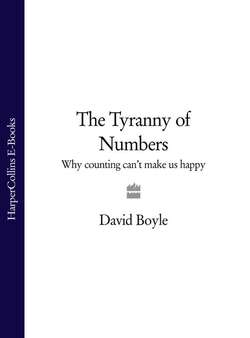Читать книгу The Tyranny of Numbers: Why Counting Can’t Make Us Happy - David Boyle - Страница 16
II
ОглавлениеJeremy Bentham was born on 15 February 1748, the son of a successful City of London lawyer who provided him with such a miserable, monotonous and gloomy childhood that he put the attainment of happiness at the centre of his philosophy. His mother died when he was ten, and life with Jeremy’s overbearing and demanding father meant no games and little fun. No other children were ever asked to the house.
Instead of embracing the law as his father intended, Bentham used his small allowance to spend his time reading the works of the philosophers David Hume and Claude Adrien Helvétius. In them he found the basis for his philosophy – that you could estimate happiness from a number of different pleasures and that public ‘utility’ was the basis of all human virtue. Reading Helvétius during the 1770s, and walking a little way behind his family – you can picture their exasperation at this gauche and bookish adolescent trailing along after them – he asked himself: ‘Have I a genius for anything?’
Adolescents ask themselves this question often. But to Bentham, the answer came like the Angel Gabriel appearing to Mary. He took the clue from the book he was reading, where Helvétius gave his opinion that legislation was the most important of earthly pursuits, an opinion widely approved by legislators the world over. ‘And have I indeed a genius for legislation?’ said the young Jeremy to himself. ‘I gave myself the answer, fearfully and tremblingly – Yes.’
Enthusiastically, and already packing his mind with this sense of historic mission, he devoured as many of the works of moral and political philosophy as he could get his hands on. Tom Paine was starting to think up his Rights of Man, there was simmering discontent in the American colonies, and ideas were dangerous world-shifting things. Bentham flung himself in. But it was when he travelled back to Oxford to vote as a university MA in the 1768 parliamentary election, that he had his real breakthrough. He was rummaging through the small library in Harper’s Coffee House, when he came across the pamphlet by the chemist Joseph Priestley, which included the phrase ‘the greatest happiness of the greatest number’. Bentham let out a sharp ‘Eureka!’ and dashed out to make it his own.
It remains the phrase for which Bentham is best known. Priestley never used it again – he didn’t need it, said Bentham – so he adapted it as the centre of his philosophy. And there it is, in the first page of the first work he ever published, A Fragment on Government: ‘It is the greatest happiness of the greatest number that is the measure of right and wrong.’
Before Bentham (or so he believed) the laws of England and the morality on which they were based were a hopeless jumble of superstition, tradition, contradiction and privilege. After Bentham there would be a clear logical reason for laws, and governments would know automatically what to do. It would no longer be a matter of balancing distrust of the people with fear, as Gladstone said later, but a simple piece of arithmetic. Government action, all action in fact, should be based on what would make most people happiest.
For the rest of his life, Bentham devoted most of his intellectual effort to working out how his Greatest Happiness Principle might become clear in practice. Borrowing the popular thinking of the time which classified diseases or the Linnean classification of plants and animals into families, he set about classifying pleasures to meet the strict demands of his legislative theory. By the end of his life, Bentham had defined 14 broad kinds of pleasure and sent a generation of followers and enthusiasts away to measure them.
‘I wish I could return in six or seven centuries time,’ he was fond of remarking, ‘so that I can see the effects of my work.’ ‘Alas! His name will hardly live so long,’ wrote the essayist William Hazlitt, putting his finger on the whole problem with utilitarianism in one neat sentence: ‘There are some tastes that are sweet in the mouth and bitter in the belly, and there is a similar contradiction and anomaly in the mind and heart of man.’
But in spite of this put-down, Bentham has managed to remain famous for over a century and a half. For a long time, it didn’t seem as if he would even achieve this. He was much better known abroad. Hazlitt was also right when he said that Bentham’s fame was in inverse proportion to the distance from his house in Westminster. When the traveller and writer George Borrow found himself arrested in Spain, he was released from prison on the grounds that he shared a nationality with the man his captor called ‘The Grand Bentham’. And when Bentham visited Paris towards the end of his life (an honorary French citizen after the Revolution) the lawyers at the courts of justice rose to receive him.
‘The case is, though I have neither time nor room to give you particulars,’ he wrote in 1810, ‘that now at length, when I am just ready to drop into the grave, my fame has spread itself all over the civilized world.’
